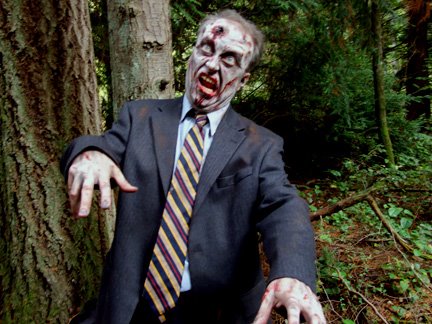
Over the last 18 years of living in London I have watched people crossing the bridges across the Thames or shuffling into, through and out of tube stations in the mornings. If you take the time it is impossible not to notice the way many people not only drag their brief cases and laptop bags with them, they seem to drag their bodies along too. It’s like watching a bad B movie called ‘The day of the Zombie Executive’. People have picked up the habit of living in their heads and forcing their bodies to comply, treating their physical selves like their car; you drive it like an extension of yourself, have it serviced occasionally but have absolutely no idea how it works let alone have a clue how to maintain it or fix it.
The main reason for this is virtually nothing most business people are required to do on a daily basis asks very much of the body – we even avoid stairs in favour of escalators and lifts. We spend most of our days sitting down, using mostly our finger tips to make a living. Utterly disconnected from the vital yet silent majority of ourselves. The sad fact is that most people only hear what the body has to say when they take a holiday and then it’s quite common for it to tell you how badly you have ignored it and how unhappy it is. Before I took up Aikido just over six years ago I had been doing the sporadic gym session here and there and some running in the mornings. I even took lessons in the Alexander Technique to try and get my body to behave how I wanted it to
All of those things were fine but they didn’t have a purpose, discipline or a set of benchmarks to be tested against. Mostly they just perpetuated the problem of treating the body like a rented car and not a valued loved one and the only home most of us will ever own mortgage free. I would of course experience periods of improvement, better wellbeing etc but then always a slip back into being a business-mind dragging a body around with me. Gravity consistently winning the battle until, at the end of each day, I would crumple into bed and have less than enough sleep to face another day without my body fully on my side.
Six years later I found myself in Japan doing an intensive 16 day training program with a possible black belt grading ahead of me. I had to maintain my body and fix it in order to make it to the next days’ training sessions, let alone those scheduled for the following week. After about four days I found myself moving with my body and not ‘dragging’ it. My body started to regularly give me more than I could have asked for. It got me up in the morning and told me what it needed in order to be sustained, really clearly. It prompted me to stretch and to practice when not in the dojo. I found it easier to manage more than one thing at a time in my life than ever before, as I did not experience a conflict or dissonance between them.
I also just stopped focusing on a bunch of stuff that isn’t really important, like what people might be thinking about me. Believe it or not I actually took up Aikido to get this from it and had seen glimmers of it along the way. Do I think you have to take up a martial art for 6 years then travel to the other side of the planet to immerse yourself in a full time training program and be tested at the end in order to get this? Essentially no. I have however learned some things that I strongly advocate – here are 5 of them that I think could be very helpful if this article has connected with you.
- Take up a practice in a martial art or some kind of physical endeavour that requires you to use both your mind and your body, and that can be pursued weekly over the course of your life; even into old age.
- Choose an activity that has both a program of measuring your development by an instructor but also agree with yourself why you are doing it and have one of those reasons to become a better person (I.e. fewer of your decisions are influence by fear).
- Check in with yourself regularly and contrast how your relationship with your body is changing and if your relationships with others are being affected in any way, good or bad.
- When you experience positive changes along the way look at how they can be of benefit to others and spend time applying what you are learning in the working and home environments. This can serve to further integrate developments in the body and yourself as a whole in the training space and with who you are becoming in other areas of your life.
- Enjoy the new developments and insights when they come whilst also taking the plateaus as a reassuring investment into the quality of your future life and the lives of those closest to you. This kind of ongoing personal development cannot fail to improve the quality of your own life without having positive effects on everyone around you.